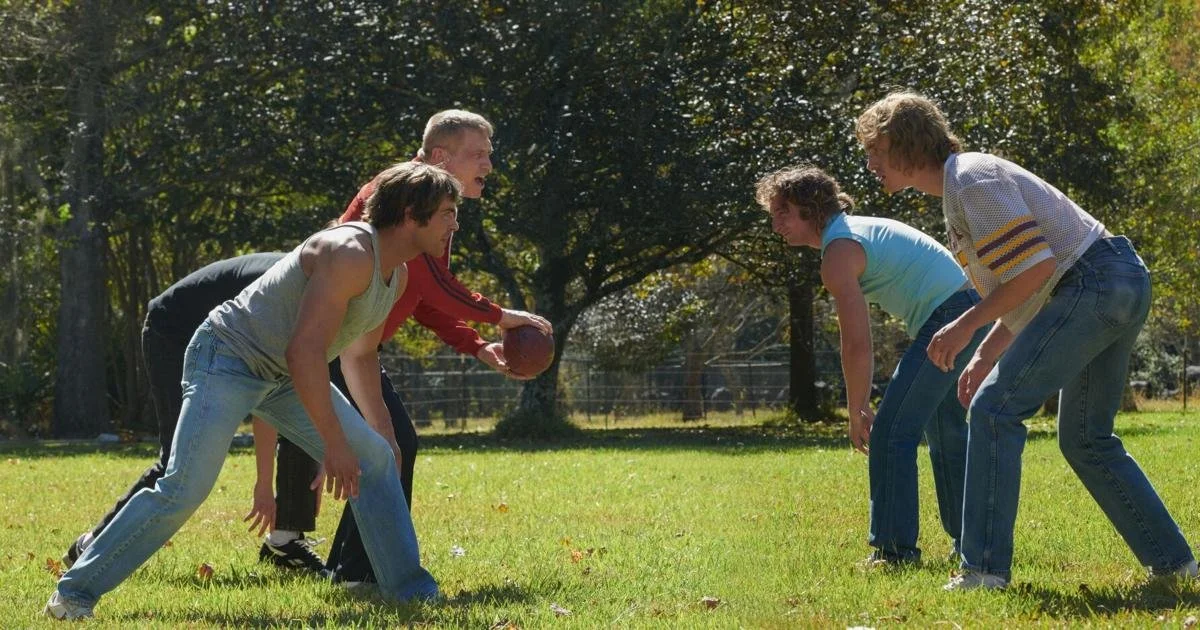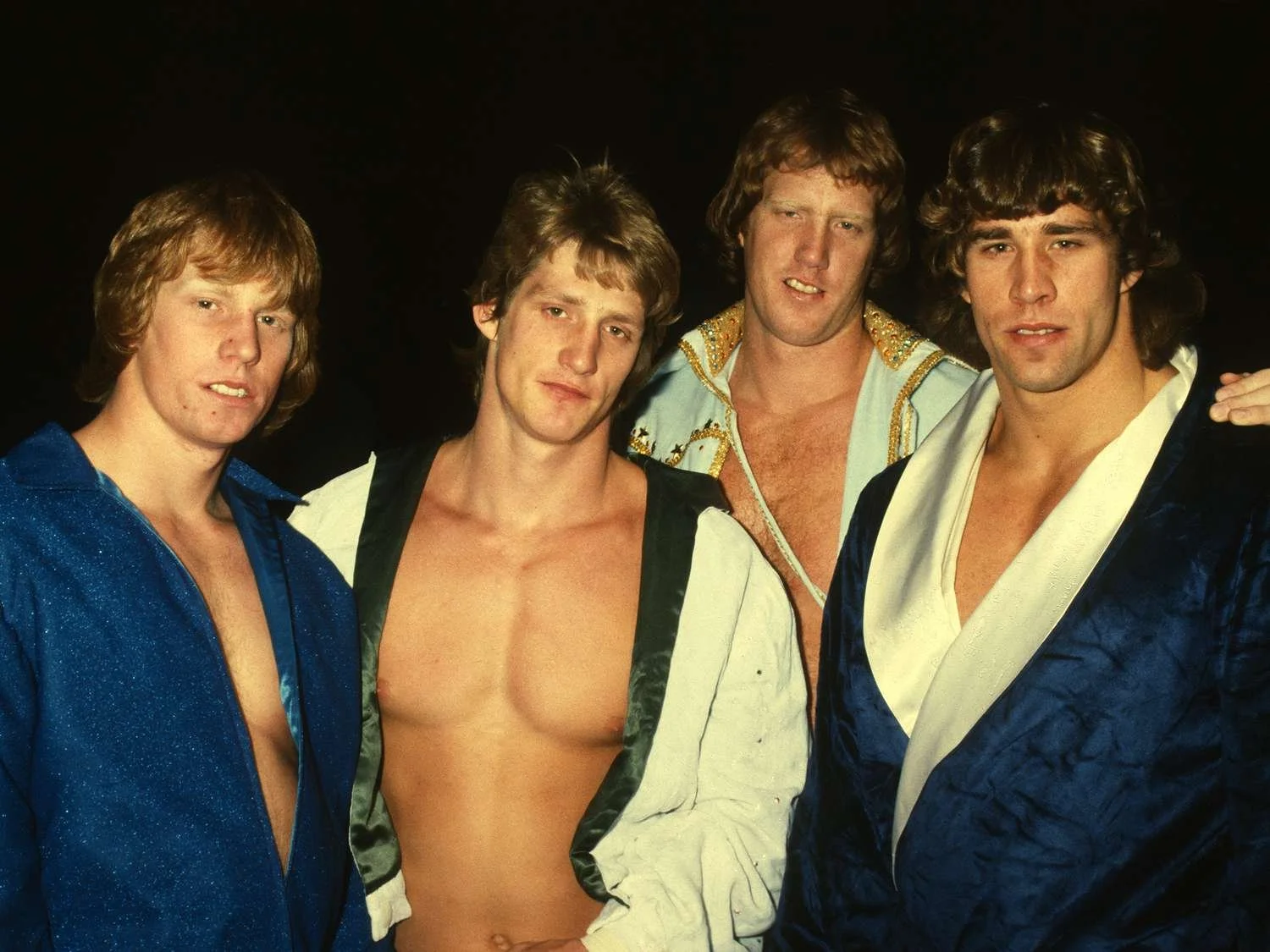The Iron Claw Review: The Real Von Erich Curse was Patriarchy All Along
By Film and TV Editor Mia Tobin Power
This article contains spoilers for The Iron Claw.
‘We all know Kerry’s my favourite, then Kev, then David, then Mike. But the rankings can always change.’ So Fritz Von Erich, patriarch of the Von Erich family, casually tells his sons at the breakfast table at the start of The Iron Claw. Writer-director Sean Durkin immediately establishes that this biopic about the tragic family of wrestlers is not just about wrestling, but about what this father gives to his sons. It’s about patriarchy, and its impact on its victims.
The Iron Claw, 2024. Dir. Sean Dirkin.
The Von Erich family were a family of wrestlers famous in the 1980s. Five of the six Von Erich brothers died in tragic circumstances, leading to the myth of the “Von Erich curse”. Durkin’s film takes the perspective of the surviving brother, Kevin. At the start of the film, his narration introduces the idea of the curse; he later explains that his father Fritz changed his name to Von Erich, Fritz’s mother’s surname, for his wrestling career. Her family also endured many tragic events, suggesting that the curse is linked to their name, or more specifically, family lineage, especially in the world of wrestling. In this same scene, Kevin tells his future wife, Pam, that he’s not the eldest brother; his older brother Jack Jr. died when he was only six years old. Jack’s death hangs over the film like a ‘memento mori’ motif, a reminder of the tragedy the Von Erichs have already experienced and foreshadowing that which is to come.
Fritz’s signature move, which his sons inherit, is the titular “iron claw”. But since it’s where the film’s title comes from, this name takes on greater symbolic significance. It’s a reminder of mortality, of how death has the Von Erichs in its grip just as they grip their opponents with the iron claw. It’s also a symbol of legacy - their father has passed this move onto them, as he passed the profession of wrestling onto them. But what about their other, darker inheritances from their father? They inherit the curse, of course, but also a way of viewing themselves, their work, and their masculinity, all of which are intertwined. Fritz pushes his sons hard, telling them, as Kevin describes, that if they work hard and become the best, nothing bad will happen to them again - which turns out to be completely wrong. He forces his sons to compete with one another, treating them more like dolls he can manoeuvre around than like his actual children. The pressure and toxic form of masculinity Fritz imposes on his sons puts them on a fast track to tragedy.
The tone of the film shifts dramatically an hour in, after David dies while on tour, from an illness which, the film implies, could have been prevented had he not pushed himself so hard, or perhaps, been pushed so hard by Fritz. One by one, the brothers die tragically, until only Kevin survives. I knew before watching the film that Kevin was the only survivor, which had an interesting impact on my viewing of it, in that I acutely felt a spectre of mortality hanging over the film. I can imagine that for a viewer who knew nothing about the real-life story, the string of deaths depicted in the film would have been even more upsetting. In fact, there was another Von Erich brother, Chris, who was also a wrestler, and who died by suicide as we see Kerry and Mike do in the film, but Durkin decided not to include him in the film; he has explained in interviews that, shockingly, it would have seemed repetitive from a narrative standpoint - that’s how devastating the Von Erich family’s story is.
The film’s theme of mortality even extends to its music. There’s a great one-take shot that takes place outside a wrestling match, featuring a “Don’t Fear the Reaper” by Blue Öyster Cult needle drop. The song is about realising that you can’t escape death and embracing it instead. But Blue Öyster Cult’s lead singer, Buck Dharma, has described it as “a love song where the love transcends the actual physical existence of the partners”. This idea could also apply to the love that exists between the Von Erich brothers. From the start, we see how close the brothers are. Early in the film, Kevin and David collect Mike from his band rehearsal and they go to get burgers together before hanging out together at the river. This sweet scene emphasises the tragedy of the toxic masculinity Fritz imposes on his sons; left to their own devices, they will enjoy each other’s company, rather than seeing each other solely as their competition.
But it’s not all about death; Durkin’s exploration of the theme of performance is just as compelling. It’s not long before the film asks (through Pam) and answers (through Kevin) the question that’s surely weighing on many viewers’ minds: but isn’t wrestling fake? Kevin explains to Pam that although the matches may be scripted and their outcomes pre-determined, it’s still a job, wherein becoming a champion equates to a promotion. The film also engages with this question, and the question of performance, on a more emotional level. How the brothers perform for their audiences, and perform masculinity in the ring, affects the “rankings” Fritz mentions at the beginning of the film. In an important match with the current NWA World Heavyweight Champion, Kevin is nearly knocked out and struggles to adequately trash-talk his competitor. When David takes the microphone from Kevin and shows his skill at this form of performance, we the audience understand in real-time how Fritz’s rankings will change. Later in the film, after David and Mike’s deaths, Kevin has another championship fight, this time against Ric Flair. Before the match, we see an extended clip of Flair’s trash-talking and posturing, complete with his extravagant persona. Flair’s exaggerated performance, especially in contrast with Kevin’s despair after the deaths of his brothers, reminds us of what wrestling is supposed to be - an act, a performance, entertainment. It has become too real for the Von Erichs.
Possibly the most striking, emotionally intense moment of the film comes just after Kerry’s death. We see Kerry, David, and Mike reunite in the afterlife, and not in the wrestling ring, but outside, by the river. Kerry even meets Jack Jr., who appears as the six-year-old he was at the time of his death. On paper, this scene sounds terrible; you can imagine the cast and crew having their concerns when preparing to shoot it. But against all odds, Durkin pulls it off, and it’s a beautiful scene. It’s a fascinating choice by Durkin not to set it in the ring. Maybe it’s because Jack Jr. was never a wrestler, but I think it’s because this place, their backyard, is if not a positive meeting place, then at very least a neutral one. The brothers may not have chosen to go down the path of professional wrestling had their father not pressured them into it. For their afterlife reunion to occur outside of the ring reflects that more positive, more innocent form of masculinity they performed around each other. This scene has been read by some viewers as imagined by Kevin, but I think to reduce it to such a realist interpretation reduces its power. Isn’t it so much more impactful to believe that, within the world of the film, this reunion between the brothers really happened, that they really saw each other again?
Rivalling the afterlife scene, though, is the final scene of the film, wherein Kevin gets emotional watching his two sons playing. When his sons notice that he’s crying, they ask why, and he replies, ‘I guess it’s because I used to be a brother.’ This devastating line reinforces the film’s emotional centre: the relationship between the Von Erich brothers, and their love for each other in the face of the competition their father fostered between them. When Fritz brings Kerry into the fray of professional wrestling, he says that he only wrestled to provide for his family, and that he hoped they would all choose a different path in life. This is so ironic it’s funny - wrestling dominates Fritz’s life, and he all but forces his sons into it; Mike wants to pursue music, but Fritz steers him away from it and towards wrestling. The patriarchal control Fritz exerts over his sons is the impetus for much of the tragedy in the film, but the bond between them despite it all shines through, making Durkin’s film a heartbreaking examination of mortality, legacy, performance, and love.
The Von Erichs. Left to Right: Mike, Kevin, David, and Kerry.




